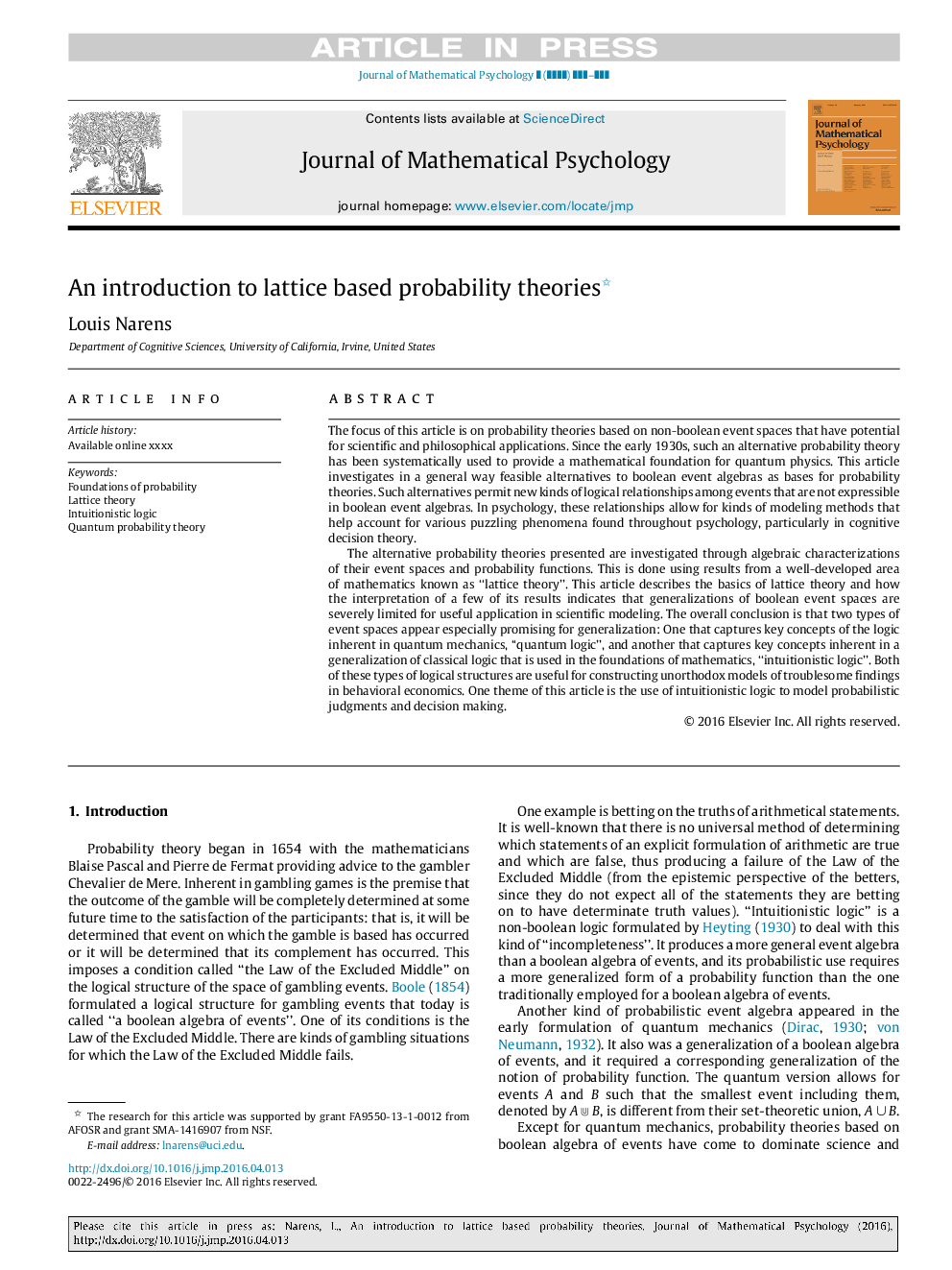| کد مقاله | کد نشریه | سال انتشار | مقاله انگلیسی | نسخه تمام متن |
|---|---|---|---|---|
| 4931854 | 1433264 | 2016 | 16 صفحه PDF | دانلود رایگان |
عنوان انگلیسی مقاله ISI
An introduction to lattice based probability theories
ترجمه فارسی عنوان
مقدمه ای بر نظریه احتمالی مبتنی بر شبکه
دانلود مقاله + سفارش ترجمه
دانلود مقاله ISI انگلیسی
رایگان برای ایرانیان
کلمات کلیدی
مبانی احتمال، نظریه شبکه منطق شهودی، نظریه احتمالی کوانتومی،
ترجمه چکیده
نظریه های احتمالی جایگزین ارائه شده توسط ویژگی های جبری فضاهای رویداد و توابع احتمالی مورد بررسی قرار می گیرند. این کار با استفاده از نتایج حاصل از یک منطقه به خوبی توسعه یافته ریاضیات شناخته شده به عنوان یک نظریه شبکه است. این مقاله، توضیح مبانی نظریه شبکه و نحوه تفسیر برخی از نتایج آن را نشان می دهد که تعمیم فضاهای رویداد بولی به شدت برای کاربرد مفید در مدل سازی علمی محدود است. نتیجه کلی این است که دو نوع فضای رویداد به طور خاص به منظور تعمیم دادن متعهد می شوند: یکی که مفاهیم کلیدی منطق ذاتی مکانیک کوانتومی، یک منطق کوانتومی و دیگری که از مفاهیم کلیدی ذاتی در تعمیم منطق کلاسیک که در پایه های ریاضیات، منطق شهود است. هر دوی این ساختارهای منطقی برای ساختن مدل های غیرواقعی از یافته های مشکل در اقتصاد رفتاری مفید هستند. یکی از تم های این مقاله استفاده از منطق شهودی برای مدل سازی قضاوت های احتمالی و تصمیم گیری است.
موضوعات مرتبط
مهندسی و علوم پایه
ریاضیات
ریاضیات کاربردی
چکیده انگلیسی
The alternative probability theories presented are investigated through algebraic characterizations of their event spaces and probability functions. This is done using results from a well-developed area of mathematics known as “lattice theory”. This article describes the basics of lattice theory and how the interpretation of a few of its results indicates that generalizations of boolean event spaces are severely limited for useful application in scientific modeling. The overall conclusion is that two types of event spaces appear especially promising for generalization: One that captures key concepts of the logic inherent in quantum mechanics, “quantum logic”, and another that captures key concepts inherent in a generalization of classical logic that is used in the foundations of mathematics, “intuitionistic logic”. Both of these types of logical structures are useful for constructing unorthodox models of troublesome findings in behavioral economics. One theme of this article is the use of intuitionistic logic to model probabilistic judgments and decision making.
ناشر
Database: Elsevier - ScienceDirect (ساینس دایرکت)
Journal: Journal of Mathematical Psychology - Volume 74, October 2016, Pages 66-81
Journal: Journal of Mathematical Psychology - Volume 74, October 2016, Pages 66-81
نویسندگان
Louis Narens,
